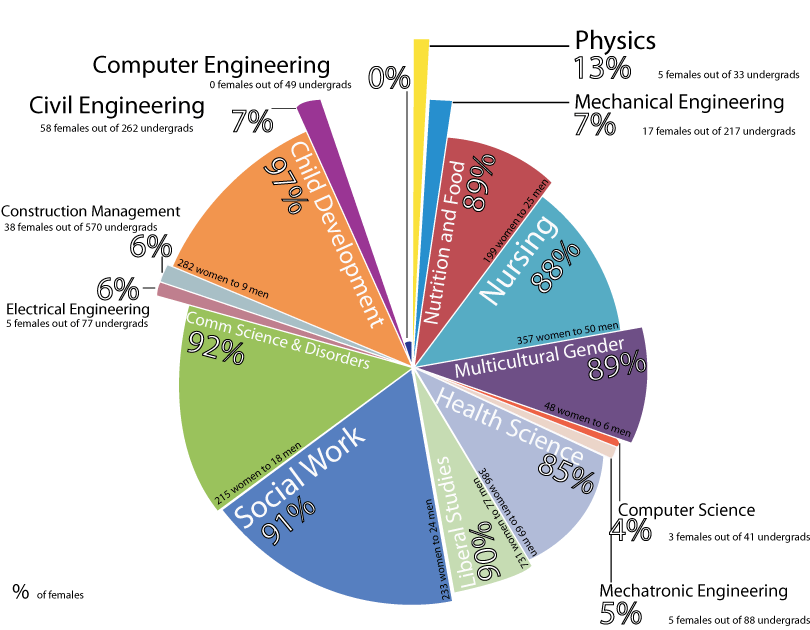
Certain majors are largely dominated by women, according to a study conducted by Jeffrey Bell, a biology professor.
The study tracked the 2010-2014 graduating class. Males made up 10 percent of the liberal studies graduating class and 9 percent of social work, according to the study.
Child development was among one of the most gender-impacted majors with only 3 percent male students.
Erick Garcia, a four-year liberal studies major, is pursuing a degree so he can be a counselor.
He is one of the only male undergraduate students in the department.
He was required to complete a certain amount of hours at elementary schools and out of all of the teachers he saw working at the school, only two were men, Garcia said.
“When a male comes into a classroom, you can see how surprised students are because they’re only used to female teachers,” he said.
Gender stratification extends to professional fields in the United States, according to article by Edudemic. Less than 25 percent of teachers in the United States are male. Only 2 percent of prekindergarten and kindergarten teachers are men and 18 percent of elementary and middle school teachers are men.
Low salary, low status and easy potential for accusations of abuse are the most recorded reasons of why men do not want to be teachers, according to the article.
Men may also not pursue degrees in liberal studies because they are more likely to be accused of abuse, said Pamela Morrell, a liberal studies advisor.
“I’ve heard people say that they don’t want their little girl to have a male teacher,” she said. “There’s something wrong with that.”
There is a societal expectation that men have to be the breadwinners and teaching may not pay enough, she said.
The same holds true for pursuing a degree in social work.
It’s not uncommon for there to be only one male student graduating with a degree in social work, said Vince Ornelas, director of the School of Social Work.
Social workers receive a lower salary which could hold men back from pursuing degrees, he said.
“Just like it’s wrong to tell a woman that it’s wrong for her to be an engineer, the same thing is true for men in female-dominated professions,” Morrell said.
Garcia was previously a biochemistry major but pursued a degree in liberal studies, Garcia said. He had a male counselor in high school who was a great role model for him and encouraged him to pursue a degree.
“It was cool to see that he’s a male and he did it and no one saw him differently because of it,” he said.
Men interested in social work will also have a difficult time finding men to look up to because there are few men depicted in the media as social workers and few men in the actual profession, Ornelas said.
Culture in the United States is a reason why men may not pursue degrees in female-dominated professions, he said. The patriarchal way of viewing the world gives certain characteristics to women and other characteristics to men.
There is a societal stigma surrounding men teaching and helping young children because they cannot be nurturing, Morrell said.
“If you look at traditional gender roles, we expect women should be with children because they are nurturing,” she said. “What we don’t expect is for men to be.”
The pressure to have a masculine job can come from peers, she said. A male student once came in her office asking to switch from liberal studies after his friends called teaching a “woman’s profession.”
“It was upsetting to me because he sat here and I could see that he really wanted to be an elementary school teacher,” Morrell said.
Madison Holmes can be reached at newseditor@theorion.com or @madisonholmes95 on Twitter.





